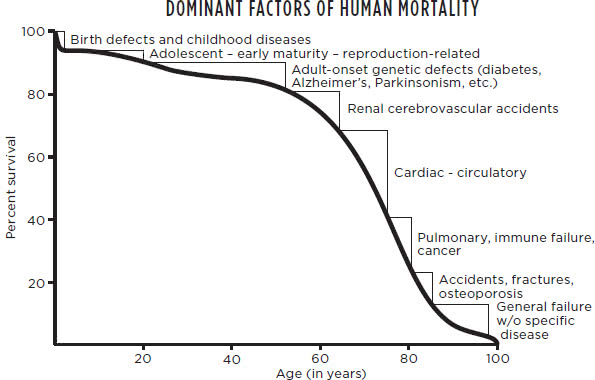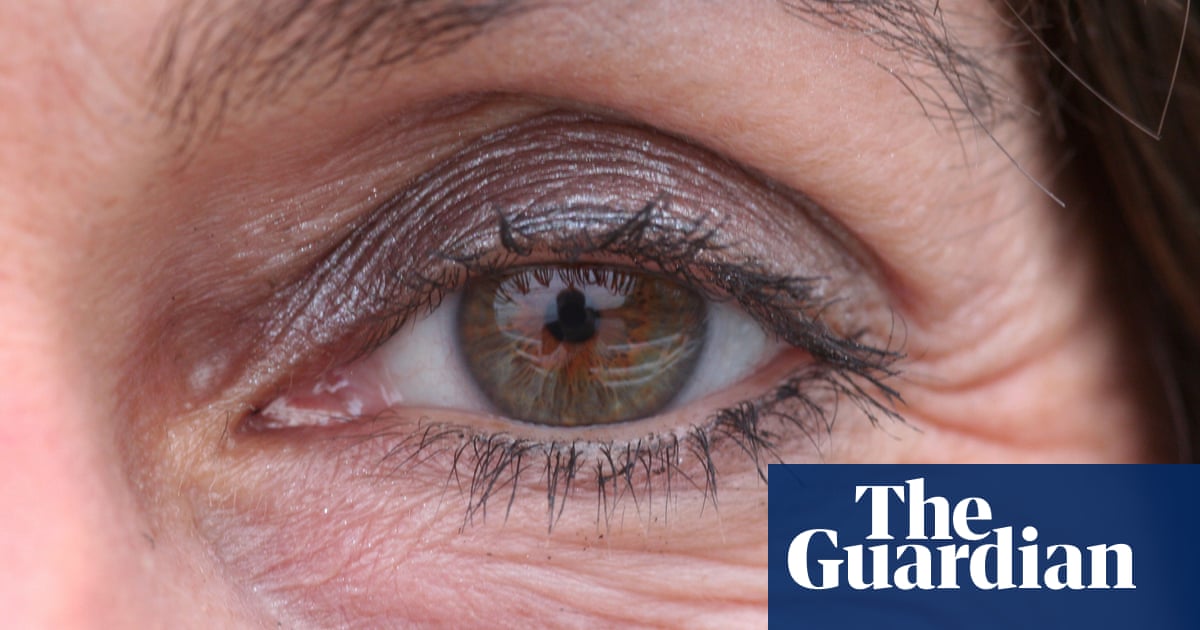If you have noticed a sudden accumulation of wrinkles, aches and pains or a general sensation of having grown older almost overnight, there may be a scientific explanation. Research suggests that rather than being a slow and steady process, aging occurs in at least two accelerated bursts.
The study, which tracked thousands of different molecules in people aged 25 to 75, detected two major waves of age-related changes at around ages 44 and again at 60. The findings could explain why spikes in certain health issues including musculoskeletal problems and cardiovascular disease occur at certain ages.
“We’re not just changing gradually over time. There are some really dramatic changes,” said Prof Michael Snyder, a geneticist and director of the Center for Genomics and Personalized Medicine at Stanford University and senior author of the study.
“It turns out the mid-40s is a time of dramatic change, as is the early 60s – and that’s true no matter what class of molecules you look at.”
…
Turned 44 6 months ago. Haven’t felt it yet. Guess it’s going to get rough soon…
Wait til you sleep wrong and wake up wondering how you threw your back our.

Yeah West in his seminal “Scale” kind of corroborates the whole story.

It seems, though, that the molecular changes you are undergoing do not immediately translate into increased mortality, so you’re going to have several more years of - presumably - feeling well until the big drop-off starts for all of us at about 60.
BTW, because of its wide range of topics, its solid scientific underpinnings and its excellent intellectual accessibility, this is one of two books I positively think should be taught at any school, the other one being Solé’s “Phase Transitions.”One morning you’ll wake up and every bone in your body will pop simultaneously. Then while you lay there aching you’ll let out a 6 mimutes and 20 second fart that doesn’t have a happy ending.
The horror.
The Guardian - News Source Context (Click to view Full Report)
Information for The Guardian:
MBFC: Left-Center - Credibility: Medium - Factual Reporting: Mixed - United Kingdom
Wikipedia about this sourceSearch topics on Ground.News
Starting to believe it. Had a babyface for the first half of my life. Now i look like a retired state trooper
Fucking great. I turn 44 next year.
48 here… i used to be able to read the freaking copyright date on those eye charts … once i hit mid 40s i need glasses.
I just got progressive bifocals. It was nice to be able to read my watch properly again, but not so nice to have to look down whenever I’m going up or down stairs and to have to move my head around all the time to see all the real estate on my monitor since it’s 27".
I’ve worn contacts for almost 40 years, but got tired of using readers these last several years to be able to, you know, read. After unsuccessfully trying multivocal contacts, I got progressive glasses. My vision? GREAT? The 3 weeks it took to get my brain used to moving my head more and my eyes just right (especially while driving) so that seeing the right part of my prescription wasn’t swinging all over the place and making me nauseous? Fucking hell. That was absolute torture. It’s worth it on the other side at least.
I do kinda miss contacts. I may get a second opinion for my prescription and try again.
In less than 2 years (in my early 40s), my eyes went from better than 20/20 with great close up, to barely 20/20 with astigmatism and I need readers
My eyes started losing strength when I was 15. 10 years later, I still got my near sight vision, but I know that will be gone in about 20 years from now…
44 is probably the average age at which people start paying for their kids’ college tuitions. That shit will age anybody.
Fuck you all, I just turned 44.

RIP
Well that explains why I feel like I’m about 80 now that I’m 47.
Woah there, save something to degrade in another 13 years.
It’s okay, my mom’s in her 80s and my dad made it to his 80s and their parents all made it to their 90s, so I have a good 5-15 years to degrade once I turn 60.
I def feel like I noticed this in my mid 40s. My face and hair all looked very different within a year.
deleted by creator
i thought becoming 30 fucked me up enough already… so i have to go through this two more times, only it will be worse? ugh…
Felt the same when i turned 30 years ago, but i improved my fitness from that point forward and improved things drastically for myself.
I’m 57 and I bike 25 to 50 miles a day, four out of every five days. A lot of age-related problems can be forestalled just by exercising and not eating too much food - and it helps to not majorly injure yourself in the process. In my opinion, the primary problem with aging is that it gives you more time to become sedentary and overweight.
I know what you mean. I make old people noises now, when I stand up from a low couch or sth.
This is reassuring, even if not true. The mid-40s slide is a bump, not a new slope.
Even more hopeful: a sudden change implies a common trigger and maybe something can be done about that trigger (sorry if the article answered it, I didn’t read)
Article focuses on behavior, not on fixing our bodies.
(Humanity has a huge issue blaming the experiencer. A large “you smelt it, you delt it” attitude.)
So is it kinda like extra stages of puberty?
The research tracked 108 volunteers
Not enough to actually mean anything.
I nominate NineMileTower for a Pulitzer Prize
I’ll take my Nobel Prize now.
🚫🔔
My favorite part of science discourse will always be people self-reporting how little they understand science the math behind statistics by complaining about sample sizes that have nothing wrong with them
Statistics? Statistically speaking they studied 0.00000135% of the population all located in California.
Again, proving the point
I don’t have the time or energy to do a full statistic course, but there’s the whole thing of sampling https://en.wikipedia.org/wiki/Sampling_(statistics)
For a very basic example, say you have 1 million people, 200 000 prefers burgers, and 800 000 prefers pizza, then say out you pick people out randomly from the group of 1 million people
How many do you need to pick out to have a 95% certainty that the ratio falls within 95% of the general distribution in the population? The answer is: 246. 246 is a big enough sample size for a 95% confidence that you are within 95% of the range of the general population distribution in this specific example
There’s a lot more to this, of course, but hopefully this is sufficient to showcase that you do not need large amounts of data to derive conclusive results
Usually in a scientific context you go more the route of calculating the confidence percentage that the data you got is random, also known as null-hypothesis testing, where the confidence percentage is the p-value. So the inverse of that is the confidence that it’s not random
But, again, there’s so much more to statistics than this, this is just the very basics.
I understand sampling, but the sample doesn’t represent the human population. Do the same test to 108 in Okinawa or any other blue zone and watch the results be different.
That’s like only sampling the burger people and then concluding that most people like burgers.
Assuming that people are biologically different enough between these two areas that is, or some other localized cause of aging at these years. Which I don’t find particularly likely, but yes, it is an assumption
As always, bigger studies are desirable, but idk if it’s much of a criticism of studies. These are for a scientific audience, after all
You’re ignoring so many factors though. Lifestyle, diets, different genetic background, etc.
Would those make a difference, I don’t know. But science doesn’t operate by saying “we’ll just ignore all these possible variables and make an assumption.” Having a sample of people all from one US State then applying that to the entire world’s population is not good science.
Read further in that paragraph:
Researchers assessed 135,000 different molecules (RNA, proteins and metabolites) and microbes (the bacteria, viruses and fungi living in the guts and on the skin of the participants).
Also, see the previous article in Nature linked in the article. That study looked at fewer proteins, but had over 4,000 participants.
I mean, that makes me even more skeptical. 108 volunteers tracked for that many sparesely populated vectors is 100% going to have hundreds of false positives just due to statistical noise.
TIL I turned 44 at 30
Oh man, 30 was the best.
Sorry to hear yours isn’t.










